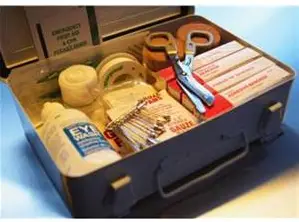
By Gaye Levy
Guest writer for Wake Up World
Something not frequently addressed within the survival and prepping world is the importance of good health and medical self-care.
What I am referring to is the importance of having the physical and mental wellness capacity to give you the stamina to to withstand adverse conditions, perhaps with minimal shelter, minimal water, minimal food stores, and minimal health care facilities.
Think about it. As much as we prep and do our best to store a years worth of food and supplies, how much attention do we actually pay to taking care of ourselves and staying informed of medical issues and topics? For most of us, I can pretty much guarantee that food and supplies come first, closely followed by bullets and band-aids.
In a very worst case scenario, would you have the stamina and health to leave the comforts of your home with only the clothes on your back, a bug-out-bag and whatever else you could physically carry? Answer honestly – are you healthy enough to do that?
I ask these questions today not to chide you to lose ten pounds or to take on a rigorous exercise routine. Instead I ask them so that you will think about your own health in terms of those things you can do now to become accomplished at medical self-care so that you will stay healthy and stay fit even when professional medical care is not readily available.
But first . . .
What the heck is medical self-care?
Medical self-care is defined as those things that individuals do to deal with minor illness and injuries at home, including preventing, detecting, and treating sickness and disease. Nothing weird, nothing “out there”. Instead, medical self-care refers to making an attempt to initially take hold of and treat minor healthcare issues yourself.
Or, put another way, simply asking yourself if you need to see a health care provider or weather you can you apply a home treatment instead. Medical self-care can be as simple as taking an over-the-counter medication for a headache or securing a sprained ankle with an ace bandage.
The important thing is that medical self-care means you are an active participant in your own health. And for that, you need to take a proactive stance and take control over your own well-being.
5 Rules of Medical Self Care that will Help Insure Survival in Adverse Conditions
1. Listen to your body since you know yourself best. When you do not feel well, take care of yourself.
Since the beginning of time, humans have suffered from mild illnesses and simply taken it easy until the illness passed. These days, however, with computers, the internet, cell phones and other gizmos, a lot of sick time is spent in the digital world instead getting real rest. If you are going to be your optimal self, when feeling unwell, take the time to slow down for a few hours or a day, and give yourself time to heal.
2. Stay abreast of common first aid procedures and utilize readily available resources to stay knowledgeable of viable solutions to everyday medical maladies.
These days, with the resources available, much day to day doctoring can be done at home. Things like taking one’s vital signs and blood pressure or testing one’s urine are easily and safely accomplished at home. Learning to do these things now without reliance on a health professional will allow to take control of your own wellness no matter what happens in our society.
3. Understand that being healthy and being well means more than simply being disease free.
The spread between wellness and illness is large with a lot of room in between. Prevention means focusing on good health while you are still on the wellness side of the spectrum rather than waiting to act only when disease or disability occurs.
4. The goal of any health care system should be to help people stay healthy by giving them the tools that they need to take care of themselves. You need to make that happen yourself.
To a large extent, individual practitioners still feel this way but for one reason or another, have had to subrogate those feelings as part of their alliance with large group practices. These larger practices – many of which are huge conglomerates – have allegiance to big pharma and wall street interests. This means that patient care comes secondary to making money.
The solution? Individuals need to take more responsibility themselves through knowledge and through healthy lifestyle choices. And when we do need medical care, we need to seek out healthcare workers who put our own needs first, above and beyond those of their employer or the greedsters who only care about money and huge year-end bonuses.
5. Genetics and environmental conditions aside, we all have a degree of control over our health and wellness. Eat a healthy diet and embrace an active lifestyle.
The human body has incredible healing powers if given half a chance to fix itself. In order to restore itself, however, we need to treat the body with respect by feeding it a healthy diet and giving it regular exercise. In addition, from a mental and spiritual point of view, we need to provide ourselves with a meaningful and strategic life.
Remember this: practicing medical self care is one more way of taking control of your life.
The Final Word
It is somewhat of a travesty to think of our health as something that can abused over time knowing that a doctor at some point down the road with fix us up just like a mechanic will tune up the engine in our aging auto-mobile. Doesn’t it make more sense to simply perform preventative maintenance on on ongoing basis?
A few good print resources to put you on the road to successful medical self care are The Doom and Bloom Survival Medicine Handbook, Where There Is No Doctor
, and the Physicians’ Desk Reference. Where there is no Doctor can also be downloaded for free from the Hesperian Foundation.
Enjoy your next adventure through common sense and thoughtful preparation!
Gaye
About the Author
Gaye Levy lives and teaches the principles of a sustainable, self-reliant and stylish lifestyle through emergency preparation and disaster planning. She does this through her website at BackdoorSurvival.com, an online preparedness blog that provides lifestyle tools, tips, and thoughts to guide you through the back door of life in the 21st century. With an emphasis on prepping and survival, she writes about and shares practical, thoughtful, and inspirational tools for survival in uncertain times.
Backdoor Survival is currently listed on the Survival Top 50. In addition, Gaye is a frequent guest on the Preparedness Radio Network and the soon to be author of a book on 21st century preparedness. Also known as SuvivalWoman, Gaye speaks her mind and delivers her message with optimism and grace, regardless of mayhem swirling around us.
You can find Gaye through her website at Backdoor Survival, on the Backdoor Survival Page on Facebook, and as Survival Woman on Twitter.

If you've ever found value in our articles, we'd greatly appreciate your support by purchasing Mindful Meditation Techniques for Kids - A Practical Guide for Adults to Empower Kids with the Gift of Inner Peace and Resilience for Life.
In the spirit of mindfulness, we encourage you to choose the paperback version. Delve into its pages away from screen glare and notifications, allowing yourself to fully immerse in the transformative practices within. The physical book enriches the learning process and serves as a tangible commitment to mindfulness, easily shared among family and friends.
Over the past few years, Wake Up World has faced significant online censorship, impacting our financial ability to stay online. Instead of soliciting donations, we're exploring win-win solutions with our readers to remain financially viable. Moving into book publishing, we hope to secure ongoing funds to continue our mission. With over 8,500 articles published in the past 13 years, we are committed to keeping our content free and accessible to everyone, without resorting to a paywall.






